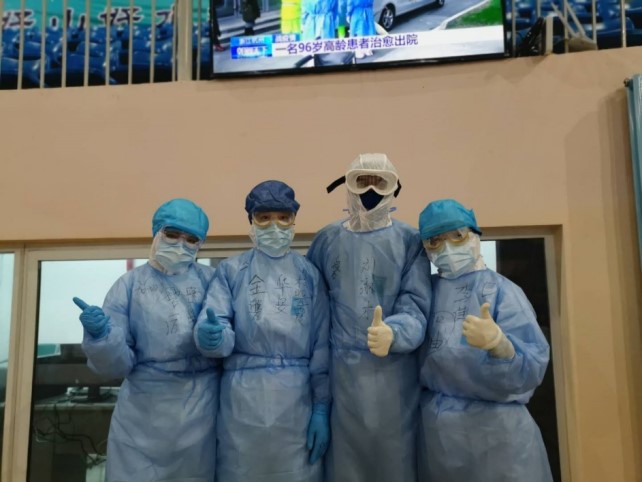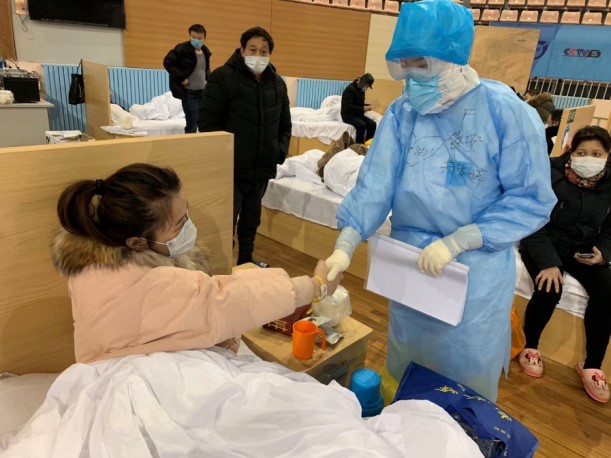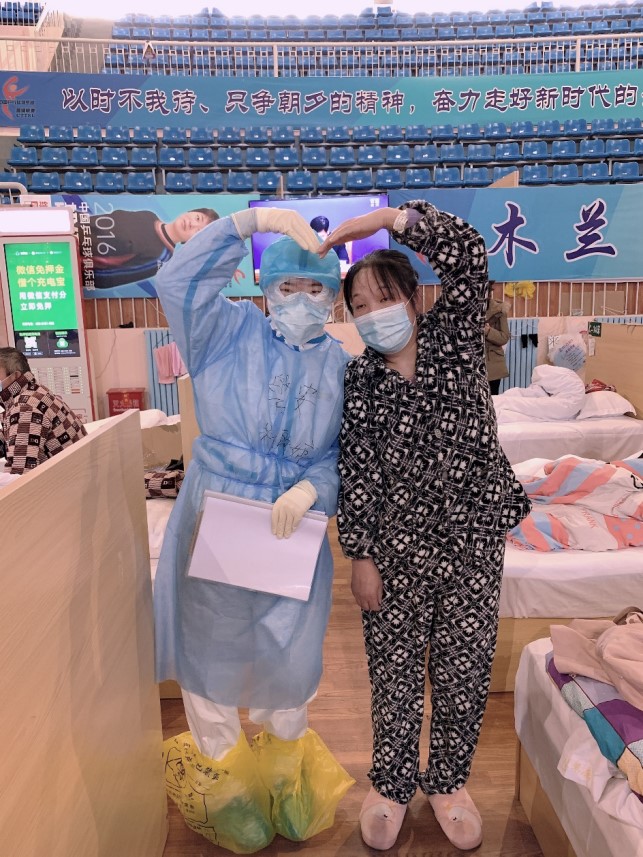 Editor's note: In the battle with the COVID-19 epidemic, more and more fighters are coming to its front lines, including students and former students of the Open University of China (OUC). Like other fighters, no matter how ordinary, they are contributing what they can. Let's take a close look at some of their stories.
Editor's note: In the battle with the COVID-19 epidemic, more and more fighters are coming to its front lines, including students and former students of the Open University of China (OUC). Like other fighters, no matter how ordinary, they are contributing what they can. Let's take a close look at some of their stories.
Zheng Jinting, an undergraduate from the Pan'an Radio and TV University (Pan'an RTVU, in Zhejiang Province) class of 2011, was part of the second group of medical staff from Pan'an County, and the third from Zhejiang Province, sent to Hubei to help deal with the new coronavirus pneumonia. Her busy days and nights there have left her many unforgettable memories.
A Hurried Farewell to Her Family

On the morning of 9 February, 2020, Zheng Jinting received an emergency notification from the leaders of the Pan'an People's Hospital to leave for Wuhan at 9 am. She had less than an hour to hurry home and say goodbye to her parents and children. Zheng Jinting's husband, who had been manning a checkpoint the night before, came to see her off. He was deeply concerned, and after she returned to the hospital and found her luggage, with everything from food to clothing, already prepared for her, she burst into tears. To her, these were not just things, but an expression of the love of her colleagues.
Escorted by the hospital leaders, Zheng Jinting and her teammates took a bus to the Zhejiang Provincial People's Hospital to meet the rest of the team. They were from various hospitals, but had a common goal: to help Wuhan, work together, and win the battle against COVID-19. At 7:15 that evening they arrived in Wuhan.
Treating Both Physical and Mental Health, and Growing as a Person

Zheng Jinting's medical team was sent to a temporary hospital in Huangpi District, where they received training, and had to pass an examination, before starting work. The training began soon after their arrival. They repeatedly practiced putting on and taking off the protective clothing, and Zheng Jinting returned to her room tired every night, as well as excited and anxious about putting her training to use. On 13 February, with their first shift in the temporary hospital extending from 2:00 to 8:00 pm, she and her teammates began to prepare themselves after lunch. Putting on and taking off protective clothing is very complicated. For the feet alone, several layers are needed: plastic over the bare feet, then socks, then another layer of plastic, and finally a wrapping of adhesive tape, with no gaps permitted.
The temporary hospital was a re-purposed gymnasium, austere in construction but fully equipped. It was divided into six areas (A, B, C, D, E and F), with Zheng Jinting assigned to F, and responsible for 13 patients, as well as assisting with triage. That day, nearly 20 new patients were suddenly admitted, and she was busy making beds, checking vital signs, and creating records all day long.
Since only those in protective clothing could be with the patients, all the work had to be done by the nurses. The heaviness of the clothing and intensity of the work gave Zheng Jinting heatstroke symptoms such as dizziness and nausea. Her sweat soaked the cloth, and made her feel cold. She really wanted to take off her goggles and mask, but knew that this was strictly forbidden. She summoned her strength to make it through, and after leaving the hospital found that her face was red with bruises, and her skin almost cracked. Nonetheless, she felt pride rather than pain. It was ten o'clock at night, exactly 10 hours after she had left the hotel.
The medical staff were responsible not only for the physical but also the mental health of the patients, who, due to the infectiousness of the new virus, were unable to receive any other company, and had to suffer and worry alone.
One day on the wards, Zheng Jinting found a patient, surnamed Zhang, to be very depressed, and covering her head with a quilt. Zheng Jinting discovered from talking to her that she was missing her family, and did her best to comfort her with the prospect of soon leaving the hospital to be reunited with them. Ms. Zhang thanked Zheng Jinting for relieving her anxiety, and praised the Zhejiang medical team for coming to help the people of Wuhan. Another patient, surnamed Bai, said one day that she was craving fruit and milk, and was overjoyed when Zheng Jinting came to work the next day with milk and fruit from the hotel.
The numerous thanks she received from her patients compensated Zheng Jinting for all her hard work in the hospital.
Continuing to Serve at a New Location

At 10:00 pm on 19 February, as Zheng Jinting was preparing to take a shower and go to bed, she checked her mobile phone and saw an important notification. The team was being asked to quickly prepare for work at the Rihai temporary hospital in Optics Valley, more than 100 kilometers away, with 3,690 beds and an urgent need of medical assistance.
As Zheng Jinting was hurriedly packing, her patients, having just received the news, used WeChat to say farewell and to thank her.
Ms. Zhang said that she could hardly bear it, and wished her well. Due to Zheng Jinting she had conquered her depression, and was now the most optimistic patient in the group. She said that in the future she would visit Zhejiang and bring Zheng Jinting special foods from Wuhan.
Uncle Song, Ms. Zhang's neighbour on the ward, promised to pick Zheng Jinting up at the airport if she ever returned.
"Dear Zhejiang Medical Team: To you I may only be a patient, but for me your value is inestimable. Thank you so much for leaving your families and coming to help us! Thank you for your care and your warmth, for neglecting your personal interests, and for risking your lives for us. You are the heroes of our times. But please also take good care of yourselves, and make it home safely when this is over. God bless, and thank you! "
The gratitude she received not only showed Zheng Jinting the value of her efforts, but also strengthened her resolve to continue fighting. After hurrying to pack up and say her goodbyes, she went on to take the battle to the next station.
By Huang Fugen and Zhang Weiya,Panan RTVU, Zhejiang